Monthly Archives: August 2023

 My aunt, Dixie Richards has been a caregiver for most of her life. Aunt Dixie was born in 1943 to George and Hattie Byer. She was the eighth of nine children. When she was born, her dad was 50 years old, and her mom was 34 years old. There were 16 years between her parents’ ages…not uncommon in those days. They married December 24, 1927. Her dad would pass away just 37 years later, and during his later years, she would be a big part of his caregiving and also her mom. Aunt Dixie was no stranger to caregiving or to having family living with you. Because her husband, my Uncle Jim Richards’ dad died when he was young, so Uncle Jim helped his family through the years.
My aunt, Dixie Richards has been a caregiver for most of her life. Aunt Dixie was born in 1943 to George and Hattie Byer. She was the eighth of nine children. When she was born, her dad was 50 years old, and her mom was 34 years old. There were 16 years between her parents’ ages…not uncommon in those days. They married December 24, 1927. Her dad would pass away just 37 years later, and during his later years, she would be a big part of his caregiving and also her mom. Aunt Dixie was no stranger to caregiving or to having family living with you. Because her husband, my Uncle Jim Richards’ dad died when he was young, so Uncle Jim helped his family through the years.
Aunt Dixie and Uncle Jim have been babysitters for their grandchildren and for a number of other kids too. 
 Many of the children of her nieces and nephews have spent time in the Aunt Dixie Daycare. They all remember it fondly. Aunt Dixie and Uncle Jim have always been there for their kids too, running errands while they were at work and unable to get away. They are the kind of people everyone knew they could count on. They had a heart of gold and would gladly give the shirt off their backs to help those around them in need.
Many of the children of her nieces and nephews have spent time in the Aunt Dixie Daycare. They all remember it fondly. Aunt Dixie and Uncle Jim have always been there for their kids too, running errands while they were at work and unable to get away. They are the kind of people everyone knew they could count on. They had a heart of gold and would gladly give the shirt off their backs to help those around them in need.
Aunt Dixie always had a soft heart. She really hated to hurt anyone’s feelings. That was never made so clear to me than the time that she “adopted” the rooster that my mom, Collene Spencer had been given as a baby. Mom was sure that it was a hen, and she intended to raise it and have eggs for the family. Never mind the fact that raising chickens in town was illegal back then. I guess my mom was just ahead of her time, because these days it’s egal and lots of people raise their own chickens now. Sadly, for my mom, “Queenie” proved to be a rooster and not a hen, which presented my mom with a dilemma. What to do with “Queenie.” Keeping the “rooster that should have been a hen” was not an option, and she didn’t have 
 the heart to kill and eat it, so she asked her sister, Aunt Dixie to take it and add it to her brood. Well, soft hearted Aunt Dixie did take “Queenie” and while I’m quite certain that the rooster became Queenie Noodle Soup at some point, I seriously doubt if Aunt Dixie ever told my mom that, and while Mom might have known it deep down, she never asked or assumed that her beloved “Queenie” was gone. I guess it was a matter of “Don’t ask, don’t tell.” Today is my Aunt Dixie’s 80th birthday. Happy birthday Aunt Dixie!! Have a great day!! We love you!!
the heart to kill and eat it, so she asked her sister, Aunt Dixie to take it and add it to her brood. Well, soft hearted Aunt Dixie did take “Queenie” and while I’m quite certain that the rooster became Queenie Noodle Soup at some point, I seriously doubt if Aunt Dixie ever told my mom that, and while Mom might have known it deep down, she never asked or assumed that her beloved “Queenie” was gone. I guess it was a matter of “Don’t ask, don’t tell.” Today is my Aunt Dixie’s 80th birthday. Happy birthday Aunt Dixie!! Have a great day!! We love you!!

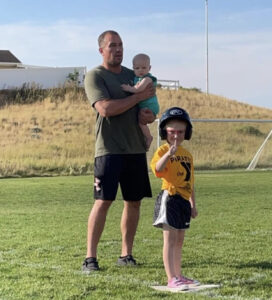 My grandnephew, Keifer Balcerzak is a true sports fanatic. He will play just about any sport out there. In the summertime, it’s time for softball or baseball. I didn’t always realize that there was a difference, but it is the hardness of the ball…obviously, but there are rule differences too. Anyway, that aside, I’m pretty sure Keifer has played both. Now that he is a grown man, he has been on teams with his dad, Dave Balcerzak, and now his brother-in-law, Dylan Herr. They have a great time, and they often win in the tournaments they play in. They also play in charity and fundraiser games as well, because these guys are known for their desire to “give back” to help those in need. The proceeds always go to a family or person in need. This year was to help the family of a young 28-year-old dad, tragically killed in a car accident, leaving behind a wife and two young children. These charity events are vital.
My grandnephew, Keifer Balcerzak is a true sports fanatic. He will play just about any sport out there. In the summertime, it’s time for softball or baseball. I didn’t always realize that there was a difference, but it is the hardness of the ball…obviously, but there are rule differences too. Anyway, that aside, I’m pretty sure Keifer has played both. Now that he is a grown man, he has been on teams with his dad, Dave Balcerzak, and now his brother-in-law, Dylan Herr. They have a great time, and they often win in the tournaments they play in. They also play in charity and fundraiser games as well, because these guys are known for their desire to “give back” to help those in need. The proceeds always go to a family or person in need. This year was to help the family of a young 28-year-old dad, tragically killed in a car accident, leaving behind a wife and two young children. These charity events are vital.
Keifer is a great dad to daughter, Reece and son, Aysa. Reece made her entrance very early and had to spend 
 time in Denver. It was a hard time for Keifer and his wife, Katie, so he knows what it means to have the support of those around you with caring hearts. Reece is already into sports, like her daddy, and I’m quite sure Aysa will be too, when he is old enough. Katie is very supportive of all the sporting activities, and so they are a happy sports family. Recently, Keifer and Katie took the kids to the fair and they had the best time. There is nothing more exciting for a kid than the carnival rides, even if it is the kiddie rides, or even the swings at the park.
time in Denver. It was a hard time for Keifer and his wife, Katie, so he knows what it means to have the support of those around you with caring hearts. Reece is already into sports, like her daddy, and I’m quite sure Aysa will be too, when he is old enough. Katie is very supportive of all the sporting activities, and so they are a happy sports family. Recently, Keifer and Katie took the kids to the fair and they had the best time. There is nothing more exciting for a kid than the carnival rides, even if it is the kiddie rides, or even the swings at the park.
Keifer, like his dad, is a computer programmer working for the State of Wyoming, but they don’t work in the same division, so they don’t get to work together. A lot of the work they do, in cyber security, which we all know is a seriously important job these days. Working for the state is a great job to have, with great benefits for a family man. Just having a family without having insurance can be a big financial burden, so it’s important to have those benefits. Keiffer is 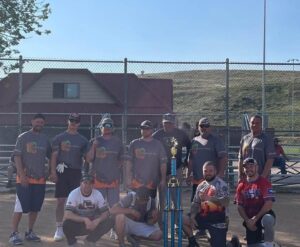
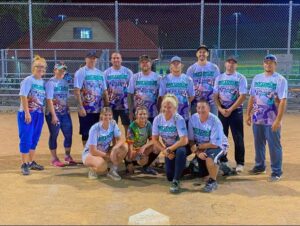 good at his job, and the state is very happy with him. I foresee a long and prosperous career there…plus, he likes his work and that makes a big difference. Keifer is a very blessed man. He has it all. A beautiful wife, and great kids, a career he loves, and buddies to play sports with. It doesn’t get any better than that. Today is Keifer’s birthday. Happy birthday Keifer!! Have a great day!! We love you!!
good at his job, and the state is very happy with him. I foresee a long and prosperous career there…plus, he likes his work and that makes a big difference. Keifer is a very blessed man. He has it all. A beautiful wife, and great kids, a career he loves, and buddies to play sports with. It doesn’t get any better than that. Today is Keifer’s birthday. Happy birthday Keifer!! Have a great day!! We love you!!
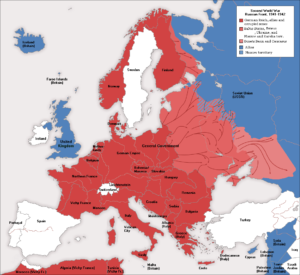
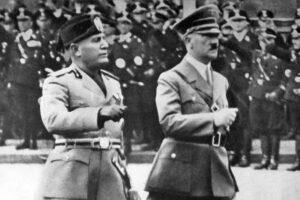 When countries choose sides in a war, there isn’t normally much chance that they will switch sides, but that is exactly what happened to Romania…and in fact, there were four countries that switched sides in that war, so maybe it isn’t so uncommon after all. At the start of the war Romania was allied and Poland and pro-British. They were trying to stay neutral, but that wasn’t easy. As the war progressed, Romania became more and more concerned about being overrun by the Soviet Union and the Fascist elements already in Romania. Finally, the decision was made to adopt a pro-German dictatorship and became an ‘affiliate state’ of the Axis Powers. The Romanian government signed the Tripartite Pact in November 1940. During the time that Romania supported the Axis powers, they supplied Nazi Germany and the Axis armies with oil, grain, and industrial products. Also, numerous train stations in the country, such as Gara de Nord in Bucharest, served as transit points for troops departing for the Eastern Front.
When countries choose sides in a war, there isn’t normally much chance that they will switch sides, but that is exactly what happened to Romania…and in fact, there were four countries that switched sides in that war, so maybe it isn’t so uncommon after all. At the start of the war Romania was allied and Poland and pro-British. They were trying to stay neutral, but that wasn’t easy. As the war progressed, Romania became more and more concerned about being overrun by the Soviet Union and the Fascist elements already in Romania. Finally, the decision was made to adopt a pro-German dictatorship and became an ‘affiliate state’ of the Axis Powers. The Romanian government signed the Tripartite Pact in November 1940. During the time that Romania supported the Axis powers, they supplied Nazi Germany and the Axis armies with oil, grain, and industrial products. Also, numerous train stations in the country, such as Gara de Nord in Bucharest, served as transit points for troops departing for the Eastern Front.
With all of this, Romania caught the eye of the Allies in 1943, and soon became a target for their aerial bombardment. One of the most notable air bombardments was the attack on the oil fields of Ploie?ti on August 1, 1943, known as Operation Tidal Wave. On April 4 and 15, 1944, Bucharest was subjected to intense Allied bombardment. On August 23, 1944, King Michael I removed the government of Ion Antonescu and declared Romanian support to the Allies. Then the Luftwaffe bombed the city Bucharest on August 24 and 25, 1944 in direct response to the Romania’s decision to switch sides. Some experts believe that by switching sides Romania helped shorten the war by several months. I’m sure that Romania was glad to be on the winning side of the war.
Romania was not the only nation to switch sides in Worls War II. They were Bulgaria, Finland, and Italy. Bulgaria also signed the Tripartite Pact in March of 1941, but Finland never signed it, but was nonetheless a co-belligerent on the side of the Axis Powers. Finland signed the Anti-Comintern Pact, an anti-communist agreement of mainly fascist powers, in November 1941. Italy had its own imperial ambitions, which were partly 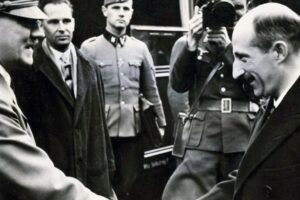
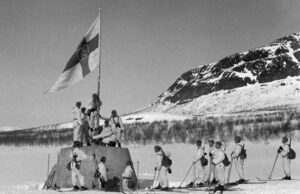 based on the Roman Empire and similar to the German policy of lebensraum, which clashed with those of Britain and France. No matter wat their aspirations were, all of these nations decided that the ways of Germany and Hitler were simply not ways they could live with, so they switched sides, joined the Allied Nations, further weakened Hitler to the point of causing his demise.
based on the Roman Empire and similar to the German policy of lebensraum, which clashed with those of Britain and France. No matter wat their aspirations were, all of these nations decided that the ways of Germany and Hitler were simply not ways they could live with, so they switched sides, joined the Allied Nations, further weakened Hitler to the point of causing his demise.
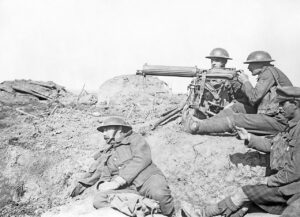 The dynamic of the world wars was probably different than most other wars…especially when it came to which units and countries were fighting side by side or against each other. When Britain declared war against Germany in August 1914, Australia was automatically also at war, because it was part of the British Empire. The New Zealand government (also under the sovereignty of the British Empire) followed without hesitation despite its geographic isolation and small population. The British Empire is for most of us, a difficult to understand group of countries that while largely independent, is also part of a larger government…the British Empire. The British Empire is a worldwide system of dependencies—colonies, protectorates, and other territories, that over a span of some three centuries was brought under the sovereignty of the crown of Great Britain and the administration of the British government. The policy of granting or recognizing significant degrees of self-government by dependencies, which was favored by the far-flung nature of the empire, led to the development by the 20th century of the notion of a “British Commonwealth” that was comprised of largely self-governing dependencies that acknowledged an increasingly symbolic British sovereignty. The term was embodied in statute in 1931. Today the Commonwealth includes former elements of the British Empire in a free association of sovereign states. Now, I don’t claim to understand the inner workings of the British Empire or the British Commonwealth, but Australia and New Zealand apparently had the option to join Britain in the war or to stand back and remain neutral. Both nations were loyal and joined Great Britain.
The dynamic of the world wars was probably different than most other wars…especially when it came to which units and countries were fighting side by side or against each other. When Britain declared war against Germany in August 1914, Australia was automatically also at war, because it was part of the British Empire. The New Zealand government (also under the sovereignty of the British Empire) followed without hesitation despite its geographic isolation and small population. The British Empire is for most of us, a difficult to understand group of countries that while largely independent, is also part of a larger government…the British Empire. The British Empire is a worldwide system of dependencies—colonies, protectorates, and other territories, that over a span of some three centuries was brought under the sovereignty of the crown of Great Britain and the administration of the British government. The policy of granting or recognizing significant degrees of self-government by dependencies, which was favored by the far-flung nature of the empire, led to the development by the 20th century of the notion of a “British Commonwealth” that was comprised of largely self-governing dependencies that acknowledged an increasingly symbolic British sovereignty. The term was embodied in statute in 1931. Today the Commonwealth includes former elements of the British Empire in a free association of sovereign states. Now, I don’t claim to understand the inner workings of the British Empire or the British Commonwealth, but Australia and New Zealand apparently had the option to join Britain in the war or to stand back and remain neutral. Both nations were loyal and joined Great Britain. 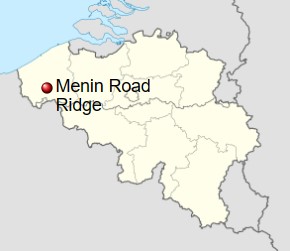
The Australian 6th Battalion was sent into warfare just two months after WWI began in August 1914. They met up with and joined the New Zealand Army, becoming the ANZAC (Australian and New Zealand Army Corps) from April 1915, while maintaining status as the Australian 6th Battalion until the unit was evacuated in December 1915. The Australian 6th Battalion fought German troops on the Western Front alongside the Allies. They were a good battalion, but for most of the time, there were no major decorations awarded…until. in September 1917, while serving in Belgium, Lieutenant Frederick Birks was awarded the only Victoria Cross ever granted within the unit. Sadly, Birks was killed in action the following day.
The Victoria Cross (VC) is “the highest and most prestigious decoration of the British honors system. It is awarded for valor ‘in the presence of the enemy’ to members of the British Armed Forces and may be awarded posthumously.” On September 17th, Birks’ battalion was moving parallel to a German line, with the orders to attack and capture the German line and blow them up. The men began moving toward their positions from Zillebeke on the night of September 18th, and immediately came under fire from gas shells. September 19th found the men holding their line, while the battalion prepared to attack the German line the next day. The battle that ensued became known as the Battle of Menin Road. Masked by a “light drizzle” of rain at 4am on 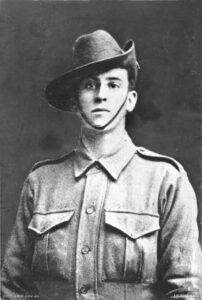 September 20th, the Germans sent barrages in front of and behind the battalion’s position. The battalion began their advanced at 5:40am. Birks and a corporal met the first German resistance and took two machine-gun positions, as another group of officers rushed a strong post. The Germans attacked the group with bombs, seriously wounding the corporal. Birks had to continue on alone. Birks advanced to the rear of the pillbox and forced the occupants to surrender. Birks went on to lead an attack a series of dugouts and pillboxes on the edge of Glencorse Wood, and fought against machine gun and bombs. He also assisted in the reorganization and consolidation of Australian men who had drifted away from their unit. September 21st brought more enemy shelling in response to the movement of Allied artillery. The shelling buried some men in Birks’ platoon. Birks attempted to dig the men out, “standing exposed” in the effort, another shell aimed at the C Coy post killed Birks, and four others, before he could save them. For his actions at Ypres, Birks was posthumously awarded the Victoria Cross, the announcement was made on November 8, 1917.
September 20th, the Germans sent barrages in front of and behind the battalion’s position. The battalion began their advanced at 5:40am. Birks and a corporal met the first German resistance and took two machine-gun positions, as another group of officers rushed a strong post. The Germans attacked the group with bombs, seriously wounding the corporal. Birks had to continue on alone. Birks advanced to the rear of the pillbox and forced the occupants to surrender. Birks went on to lead an attack a series of dugouts and pillboxes on the edge of Glencorse Wood, and fought against machine gun and bombs. He also assisted in the reorganization and consolidation of Australian men who had drifted away from their unit. September 21st brought more enemy shelling in response to the movement of Allied artillery. The shelling buried some men in Birks’ platoon. Birks attempted to dig the men out, “standing exposed” in the effort, another shell aimed at the C Coy post killed Birks, and four others, before he could save them. For his actions at Ypres, Birks was posthumously awarded the Victoria Cross, the announcement was made on November 8, 1917.
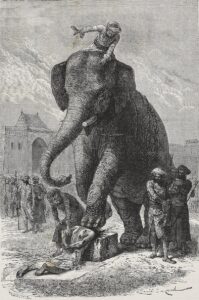 Elephants are naturally non-aggressive animals. In fact, they are known to be one of the most emphatic and kind species in the whole animal kingdom. Their caring nature is well documented in dozens of videos online displaying their sensitivity and caring behavior both towards people and other elephants. Nevertheless, their very size, along with certain situations can make they very dangerous to humans. If elephants do attack humans or other animals, it is normally because they were provoked. Most attacks are acts of self-defense or the protection of their calves. Of course, there are other reasons, such as when they feel threatened or when they are harmed, ill, or mistreated. Females can be extremely aggressive when their young ones are nearby, similar to a mama bear. Male elephants are sometimes aggressive when displaying their dominance, or if they are experiencing musth, which is caused by a huge surge of testosterone, about 60 times the usual amount, and it makes even usually very calm bull Elephants aggressive. One other reason that elephants can be aggressive toward humans…sadly, is if they are trained to be aggressive toward humans.
Elephants are naturally non-aggressive animals. In fact, they are known to be one of the most emphatic and kind species in the whole animal kingdom. Their caring nature is well documented in dozens of videos online displaying their sensitivity and caring behavior both towards people and other elephants. Nevertheless, their very size, along with certain situations can make they very dangerous to humans. If elephants do attack humans or other animals, it is normally because they were provoked. Most attacks are acts of self-defense or the protection of their calves. Of course, there are other reasons, such as when they feel threatened or when they are harmed, ill, or mistreated. Females can be extremely aggressive when their young ones are nearby, similar to a mama bear. Male elephants are sometimes aggressive when displaying their dominance, or if they are experiencing musth, which is caused by a huge surge of testosterone, about 60 times the usual amount, and it makes even usually very calm bull Elephants aggressive. One other reason that elephants can be aggressive toward humans…sadly, is if they are trained to be aggressive toward humans.
In Ancient Asia, death by elephant was no accident…it was a popular form of execution. In this practice, elephants were trained to slowly break bones, crush skulls, twist off limbs, or even execute people using large blades fitted to their tusks. In some parts of Asia, this method of execution was still popular up to the late 19th 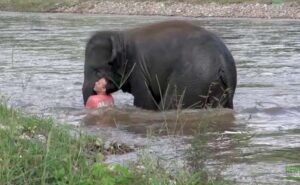 century. A form of capital punishment, execution by elephant was used in South and Southeast Asia, particularly in India, where Asian elephants were used to crush, dismember or torture captives in public executions. It was a form of capital punishment, but also used as a type of sport for the captors, and intimidation for everyone else. Depending on the “sentence” the elephants were trained to kill their victims immediately or to torture them slowly over a prolonged period of time, before killing them. It was a cruel and hideous form of “punishment” most commonly employed by royalty. Owning Executioner Elephants signified both the ruler’s power of life and death over his subjects and his ability to control wild animals. Elephant executions have been recorded in contemporary journals and accounts of life in Asia by European travelers. Before long, outrage over the cruelty of such practices brought about its eventual suppression by the European colonial powers that colonized the region in the 18th and 19th centuries. The practice was mostly confined to Asia, but it was occasionally used by Western and African powers, such as Ancient Rome and Carthage, particularly to deal with mutinous soldiers.
century. A form of capital punishment, execution by elephant was used in South and Southeast Asia, particularly in India, where Asian elephants were used to crush, dismember or torture captives in public executions. It was a form of capital punishment, but also used as a type of sport for the captors, and intimidation for everyone else. Depending on the “sentence” the elephants were trained to kill their victims immediately or to torture them slowly over a prolonged period of time, before killing them. It was a cruel and hideous form of “punishment” most commonly employed by royalty. Owning Executioner Elephants signified both the ruler’s power of life and death over his subjects and his ability to control wild animals. Elephant executions have been recorded in contemporary journals and accounts of life in Asia by European travelers. Before long, outrage over the cruelty of such practices brought about its eventual suppression by the European colonial powers that colonized the region in the 18th and 19th centuries. The practice was mostly confined to Asia, but it was occasionally used by Western and African powers, such as Ancient Rome and Carthage, particularly to deal with mutinous soldiers.

While some elephants were trained to be cruel and aggressive, the fact remains that this is not their natural behavior. In fact, there have been many accounts of elephants helping humans, and many of these were not because they were told to help, but rather that the elephants sensed that the human was in need of assistance. They are incredibly smart, and they see things around them clearly. They can even paint the things they see. They feel, they love, and they cry. Training these beautiful animals to kill was just as cruel to them as it was to their victims. I’m sure those executions were something the elephants could never forget.
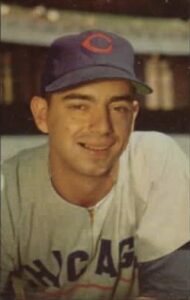 The world was a crazy place on August 20, 1945. It was just eleven days after the atomic bombing of Nagasaki, Japan. The world was a little “scary.” Just knowing that entire towns could be blown off the face of the earth in an instant, changed the whole perspective of life as we knew it. The war was almost over. By September 2, 1945, World War II would be a blip in the rearview mirror of history. Maybe it was time to look for something…happy, for a change.
The world was a crazy place on August 20, 1945. It was just eleven days after the atomic bombing of Nagasaki, Japan. The world was a little “scary.” Just knowing that entire towns could be blown off the face of the earth in an instant, changed the whole perspective of life as we knew it. The war was almost over. By September 2, 1945, World War II would be a blip in the rearview mirror of history. Maybe it was time to look for something…happy, for a change.
Enter Brooklyn Dodgers utility player, Tommy Brown. He was a local kid, who was born December 6, 1927, in the Bensonhurst section of Brooklyn. Brown never knew his father and was raised primarily by an aunt and uncle. That was probably the best thing that could have happened. Brown’s upbringing was such that he was able to make something of himself. He started playing baseball, and he was good enough to be called up to the Majors. Brown made his debut with the Dodgers in 1944, when he was just 16 years old. It was an unusual time, because during World War II, millions of men served overseas, so the ball players were serving in the military. Men like future Hall of Famers Ted Williams and Yogi Berra were among them. That left a group of aspiring teenagers in line for the majors in an almost unheard of shot in the big leagues. Fifteen-year-old Joe Nuxhall was also called up and pitched 2/3 of an inning for the Cincinnati Reds in the summer of 1944. It would be almost like they were replacement players.
On August 3, 1944, while playing for the Newport News (Virginia) Builders of the Class B Piedmont League, Brown got the call that changed not only his life, but baseball history forever. He was headed to the majors,  with the Brooklyn Dodgers. Apparently, they had tried Bobby Bragan at shortstop but were looking for someone more mobile. Dodgers’ manager Leo Durocher told Brown that day he would play both games of a doubleheader against the Chicago Cubs. After that shock wore off…for about a second, “Brown, according to a bio on the Society of American Baseball Research web site, advised his manager that he had ridden the train all night, ‘but Leo responded that he didn’t care.'” I guess they were desperate. Brown became the youngest non-pitcher ever to play in a major league game, and the second-youngest overall after Joe Nuxhall, who was 15 years and 316 days old when he first appeared as a pitcher for the Cincinnati Reds on June 10, 1944. He got two hits in eight at-bats as the Cubs beat the Dodgers in both games, 6-2 and 7-1. In 1944, he played a total of 46 games, hitting .164 without a homer. Brown, nicknamed “Buckshot,” threw and batted right-handed. He stood 6 feet 1 inch tall and weighed 170 pounds. Then, on August 20, 1945, he hit a home run…his team’s only run in an 11-1 loss to the Pittsburgh Pirates. He finished that season with a .245 batting average. That home run may not seem like much, but remember that Brown was just 16 years old at the time. With that “homer” to
with the Brooklyn Dodgers. Apparently, they had tried Bobby Bragan at shortstop but were looking for someone more mobile. Dodgers’ manager Leo Durocher told Brown that day he would play both games of a doubleheader against the Chicago Cubs. After that shock wore off…for about a second, “Brown, according to a bio on the Society of American Baseball Research web site, advised his manager that he had ridden the train all night, ‘but Leo responded that he didn’t care.'” I guess they were desperate. Brown became the youngest non-pitcher ever to play in a major league game, and the second-youngest overall after Joe Nuxhall, who was 15 years and 316 days old when he first appeared as a pitcher for the Cincinnati Reds on June 10, 1944. He got two hits in eight at-bats as the Cubs beat the Dodgers in both games, 6-2 and 7-1. In 1944, he played a total of 46 games, hitting .164 without a homer. Brown, nicknamed “Buckshot,” threw and batted right-handed. He stood 6 feet 1 inch tall and weighed 170 pounds. Then, on August 20, 1945, he hit a home run…his team’s only run in an 11-1 loss to the Pittsburgh Pirates. He finished that season with a .245 batting average. That home run may not seem like much, but remember that Brown was just 16 years old at the time. With that “homer” to 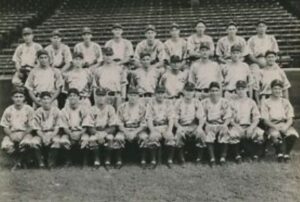 his credit, Brown remains the youngest player to homer in a Major League Baseball game, a record that will likely never be broken.
his credit, Brown remains the youngest player to homer in a Major League Baseball game, a record that will likely never be broken.
Brown played seven more seasons in the big leagues, spending time with the Philadelphia Phillies and Cubs after leaving Brooklyn. He never became anything more than a part-time player, but he will always have the distinction of youngest person to homer to his credit. Brown married a woman from Nashville and stayed in that area after his playing career ended. He worked at the Ford Glass Plant for thirty-five years, before retiring in 1993. He continues to live in retirement in Brentwood, Tennessee.

 When someone is being bullied or even just ignored, they can get depressed, or they can do whatever it takes to better their situation. Sometimes that means switching schools, because the one you were at won’t help the situation, and sometimes it means standing up for yourself, but sometimes it means both. That is the situation my grandniece, Aleesia Spethman found herself in for the past two years at her school, and it turns out it was the boys doing the bullying. One even threw a metal water bottle in her face, chipping her tooth. The school refused to do anything about it. So, her parents, Jenny and Steve Spethman switched her from one school to another mid-year, and it has been the best thing for Aleesia. She is away from the problem kids, and she has become tougher, so she doesn’t let that happen to her again. Things like this really make me mad, because Aleesia is a sweet young lady, and she shouldn’t have to put up with such nonsense. The school should have protected her. It is completely unacceptable that they stood by and did nothing!!
When someone is being bullied or even just ignored, they can get depressed, or they can do whatever it takes to better their situation. Sometimes that means switching schools, because the one you were at won’t help the situation, and sometimes it means standing up for yourself, but sometimes it means both. That is the situation my grandniece, Aleesia Spethman found herself in for the past two years at her school, and it turns out it was the boys doing the bullying. One even threw a metal water bottle in her face, chipping her tooth. The school refused to do anything about it. So, her parents, Jenny and Steve Spethman switched her from one school to another mid-year, and it has been the best thing for Aleesia. She is away from the problem kids, and she has become tougher, so she doesn’t let that happen to her again. Things like this really make me mad, because Aleesia is a sweet young lady, and she shouldn’t have to put up with such nonsense. The school should have protected her. It is completely unacceptable that they stood by and did nothing!!
With Aleesia’s move to a different school, came a whole new group of friends. This part of the transition was really important, because it added to her confidence. Aleesia decided to cut her hair and get a new look too, 
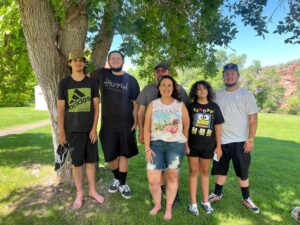 and it really does make her look grown up. She said the “new do” makes her feel older too, and more herself. This year will bring yet another school change, because Aleesia will be starting middle school. Aleesia has always been pretty mature for her age and really doesn’t like drama, which is another sign of maturity. Only the immature kids have to stir up drama as an attention getter. It’s ridiculous. Aleesia is learning to play the electric guitar, and she really enjoys it. She comes from a long line of guitar players, so it isn’t surprising to me. She will be a great guitarist.
and it really does make her look grown up. She said the “new do” makes her feel older too, and more herself. This year will bring yet another school change, because Aleesia will be starting middle school. Aleesia has always been pretty mature for her age and really doesn’t like drama, which is another sign of maturity. Only the immature kids have to stir up drama as an attention getter. It’s ridiculous. Aleesia is learning to play the electric guitar, and she really enjoys it. She comes from a long line of guitar players, so it isn’t surprising to me. She will be a great guitarist.
For Aleesia, the first day of summer means hitting the pool with her mom and a friend or two. Aleesia loves to swim and is quite “at home” in the pool. They go to the Rec Center pool a lot, probably because of the slide and such. While she is quite social, Aleesia is also a “home body” and doesn’t like to be away from home a lot. She 
 doesn’t spend the night at other people’s houses, with the exception of her grandmother, Cheryl Masterson. She does, however, like to have friends stay the night with her, and so she regularly has “slumber parties” with multiple friends staying at her house. The next year really is looking up, and she is very excited about it. Yep, life’s changing, and it’s for the better. Today is Aleesia’s 11th birthday. Happy birthday Aleesia!! Have a great day!! We love you!!
doesn’t spend the night at other people’s houses, with the exception of her grandmother, Cheryl Masterson. She does, however, like to have friends stay the night with her, and so she regularly has “slumber parties” with multiple friends staying at her house. The next year really is looking up, and she is very excited about it. Yep, life’s changing, and it’s for the better. Today is Aleesia’s 11th birthday. Happy birthday Aleesia!! Have a great day!! We love you!!
 Any time you are working with or storing gun powder or other explosives, you run the risk of an explosion. I don’t think that any such explosion is death-free, unless possibly if the factory or warehouse is empty at the time. That is unlikely, because most of these places have at the very least, security personnel working there 24/7 and many run shifts around the clock as well. Of course, that is in today’s world. Back in 1769, however, it is unlikely that people were in the facility 24/7.
Any time you are working with or storing gun powder or other explosives, you run the risk of an explosion. I don’t think that any such explosion is death-free, unless possibly if the factory or warehouse is empty at the time. That is unlikely, because most of these places have at the very least, security personnel working there 24/7 and many run shifts around the clock as well. Of course, that is in today’s world. Back in 1769, however, it is unlikely that people were in the facility 24/7.
A part of the Republic of Venice…Brescia was the site of the Bastion of San Nazaro, a military arsenal and powder storage area. About 200,000 pounds of black powder was stored at the site, enough to destroy about a sixth of the city when a lightning bolt set off the blast in 1769. Because buildings then were not built in such a way as to protect from fire and lightning, there was more risk of disaster than we have today, and there is plenty of 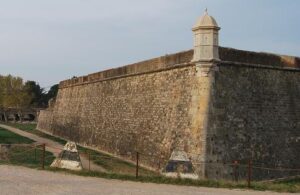 risk today, but possibly less from lightning. Unfortunately, in 1769, disaster came in the form of lightning striking the structure. The ensuing explosion actually devastated the town. When the lightning struck, it started a fire that ignited 198,416 pounds of gunpowder stored at the bastion. As the fire burned, it caused a massive explosion which destroyed one-sixth of the Brescia and killed approximately 6,000 people. Giant rocks and building stones were launched about a kilometer away in every direction, causing massive damage to the surrounding area and crushing unfortunate people. The blast also blew out windows and blew in doors to buildings over a wide area.
risk today, but possibly less from lightning. Unfortunately, in 1769, disaster came in the form of lightning striking the structure. The ensuing explosion actually devastated the town. When the lightning struck, it started a fire that ignited 198,416 pounds of gunpowder stored at the bastion. As the fire burned, it caused a massive explosion which destroyed one-sixth of the Brescia and killed approximately 6,000 people. Giant rocks and building stones were launched about a kilometer away in every direction, causing massive damage to the surrounding area and crushing unfortunate people. The blast also blew out windows and blew in doors to buildings over a wide area.
With a reported death toll of around 6000, this Italian disaster ranks among the worst of the black powder explosions of all time. Who would have thought that an explosion could take out one-sixth of a city? Today,  Brescia has over 200,000 people, and while we don’t know the population back then, we know that a devastation of one-sixth of it killed 3,00 to 6,000 people, so it must have had as many as 50,000 people living there in 1769. The number of fatalities varies among those making estimates, with some saying 3,000. Nevertheless, 3,000 or 6,000 is irrelevant because any loss of life is devastating. This particular tragedy motivated Benjamin Franklin to experiment with the use of lightning rods to protect powder storage buildings. His work found a way to help make buildings a little safer and so lightning rod usage was advised in powder storage buildings…advice apparently taken by the British.
Brescia has over 200,000 people, and while we don’t know the population back then, we know that a devastation of one-sixth of it killed 3,00 to 6,000 people, so it must have had as many as 50,000 people living there in 1769. The number of fatalities varies among those making estimates, with some saying 3,000. Nevertheless, 3,000 or 6,000 is irrelevant because any loss of life is devastating. This particular tragedy motivated Benjamin Franklin to experiment with the use of lightning rods to protect powder storage buildings. His work found a way to help make buildings a little safer and so lightning rod usage was advised in powder storage buildings…advice apparently taken by the British.
 There are many unique towns in this world, but I think very few of them could rival the town of Suloszowa, in Poland. The town was nicknamed “Little Tuscany” because of its unusual layout. Suloszowa is located in southern Poland, 29 kilometers northwest of Krakó. The one thing that makes Suloszowa so strange is the fact that the town has one street in it…an almost 6-mile-long street, on which the only turns are into someone’s property. Any stores in the town are located on that one street as well. The main street of Suloszowa is called Olkuska. It is such a strange thing to have only one street in town, and by the way, it also forms Route 773, which crosses the town from end to end.
There are many unique towns in this world, but I think very few of them could rival the town of Suloszowa, in Poland. The town was nicknamed “Little Tuscany” because of its unusual layout. Suloszowa is located in southern Poland, 29 kilometers northwest of Krakó. The one thing that makes Suloszowa so strange is the fact that the town has one street in it…an almost 6-mile-long street, on which the only turns are into someone’s property. Any stores in the town are located on that one street as well. The main street of Suloszowa is called Olkuska. It is such a strange thing to have only one street in town, and by the way, it also forms Route 773, which crosses the town from end to end.
Think about the neighbors you have. Are their yards messy? Do they play their music too loud? Are their vehicles too loud? Now imagine that your “neighbors” are everyone in town. Imagine the local motorcycle “speed freak” who is always screaming down your little block-long street. Now imagine that the local “speed freak” had almost 6 miles to get through the block…lots of time to pick up speed. If your neighborhood was one in which the irritations never end, a street like Olkuska could be a nightmare, but the people of Suloszowa seem to get  along!! All the 5,819 (as of 2017) people in town live in harmony with each other as they share the single road that stretches through the town. How’s that for strange?
along!! All the 5,819 (as of 2017) people in town live in harmony with each other as they share the single road that stretches through the town. How’s that for strange?
The town of Suloszowa is what is known as “a linier settlement, which is a (normally small to medium-sized) settlement or group of buildings that is formed in a long line. Many of these settlements are formed along a transport route, such as a road, river, or canal. Others form due to physical restrictions, such as coastlines, mountains, hills or valleys. Linear settlements may have no obvious center.” On both sides of the Olkuska Street, or the only street in the town of Suloszowa, people have built houses adjacent to one another. They all have rectangular gardens or fields that stretch far away from the main road of the town. The view from the air is…stunning, and a photo of it recently went viral on social media. With that, the people of the town decided to  share their experiences of living in the single-street town. One said, “I wouldn’t trade this place for anything else. It has its own charm and atmosphere. As the saying goes, there’s something about it.” I think that all the people share the same sentiment.
share their experiences of living in the single-street town. One said, “I wouldn’t trade this place for anything else. It has its own charm and atmosphere. As the saying goes, there’s something about it.” I think that all the people share the same sentiment.
As for Suloszowa, the route predated the settlement. Then when the settlement grew, no other roads were added. I’m sure that when people purchased the land behind their homes, it made the idea of additional streets even more difficult, and since the people all got along so well, the town was just left it as it was. Adding additional streets soon became a non-issue, and new purchases were just added to the ends of the street. The people added, “The whole place looks the same: there is a house and then a strip of field, hence the beauty of the photos. One has grain, the other has rapeseed, and the third has something else. The colors look beautiful from above.” I must agree…the aerial photo is beautiful.
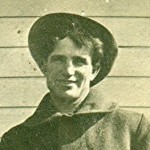
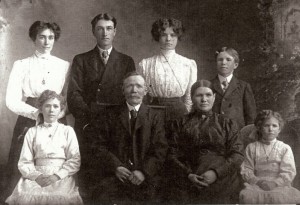 When I think of my grandfather, Allen Luther Spencer, who was my dad, Allen Lewis Spencer’s dad, I usually think of his carpenter days with the Great Northern Railroad. That is because that was the job he held for probably most of his working years. I have seen a desk that he made, and it is beautiful, but of course, there weren’t many, or maybe not any, desks on railroad trains. Mostly he made things like seats, probably, unupholstered, which I would find extremely uncomfortable these days. I have ridden on trains from that era, and those old bench seats were not meant for long trips. Still, the workmanship is interesting, and they were well designed. I don’t know what kind of seats or other things my grandfather build, but I know that he was a talented carpenter.
When I think of my grandfather, Allen Luther Spencer, who was my dad, Allen Lewis Spencer’s dad, I usually think of his carpenter days with the Great Northern Railroad. That is because that was the job he held for probably most of his working years. I have seen a desk that he made, and it is beautiful, but of course, there weren’t many, or maybe not any, desks on railroad trains. Mostly he made things like seats, probably, unupholstered, which I would find extremely uncomfortable these days. I have ridden on trains from that era, and those old bench seats were not meant for long trips. Still, the workmanship is interesting, and they were well designed. I don’t know what kind of seats or other things my grandfather build, but I know that he was a talented carpenter.
Grandpa met my grandmother, Anna Schumacher Spencer, through her brother, Albert Schumacher, who was his good friend. Once he got to know the family, he did his best to be a good son-in-law to my great grandparents, Carl and Albertine Schumacher, and brother-in-law to the younger kids. My great grandparents had a 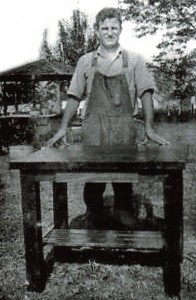 ten-acre lake on their property in those days, but it wasn’t really anything the kids could exactly enjoy, so my grandfather decided to seed the lake with fish, so they could go fishing, and it would provide food for the family for years to come. He also built a flat-bottom boat so the kids could actually go out on the lake to do their fishing. The boat isn’t surprising, since he was a carpenter, but seeding the lake. Who knew that he knew anything about that?
ten-acre lake on their property in those days, but it wasn’t really anything the kids could exactly enjoy, so my grandfather decided to seed the lake with fish, so they could go fishing, and it would provide food for the family for years to come. He also built a flat-bottom boat so the kids could actually go out on the lake to do their fishing. The boat isn’t surprising, since he was a carpenter, but seeding the lake. Who knew that he knew anything about that?
Life wasn’t always easy for my grandparents. They went through a number of tough years in history. It’s hard for me to believe, but my grandpa was born just fourteen years after the Civil War ended. Our nation had witnessed its first Presidential assassination (later, there would be four more, and of these, my grandfather would be alive for two). The nation was likely still reeling from the Lincoln assassination in 1865, when in 1881, James Garfield was assassinated, followed by William McKinley in 1901. In my lifetime, we have had one successful assassination, when President Kennedy was assassinated. The identity of the perpetrator or perpetrators is still a source of contention on that one to this day. There have been plots and attempts on most presidents, but we may not have heard of most of them. Politics can be a dangerous game.
My grandparents also lived through World War I and II, as well as the “Roaring Twenties” and the Great Depression. Grandpa spent time farming, as well as the oil fields of Texas, the lumber industry of Northern Minnesota, and the Great Northern Railroad. He even did a little time in the fur trade, trapping a number of animals, including skunks (wow), but I don’t think he found that to be very successful…and I’m sure the smell 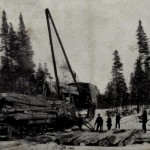
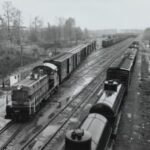 was not his favorite thing either. Looking back at Grandpa’s life, I would have to say that he led an “interesting” sort of life. He had, what could be classified as several careers before he retired. I never met my grandfather. He passed away in 1951. I think that when I meet him in Heaven, I will spend quite some time asking him about his life. I think that as a “history buff,” I will really find his life an interesting story. Today is the 144th anniversary of my grandfather’s birth. Happy birthday in Heaven, Grandpa Spencer. We love and miss you very much.
was not his favorite thing either. Looking back at Grandpa’s life, I would have to say that he led an “interesting” sort of life. He had, what could be classified as several careers before he retired. I never met my grandfather. He passed away in 1951. I think that when I meet him in Heaven, I will spend quite some time asking him about his life. I think that as a “history buff,” I will really find his life an interesting story. Today is the 144th anniversary of my grandfather’s birth. Happy birthday in Heaven, Grandpa Spencer. We love and miss you very much.

